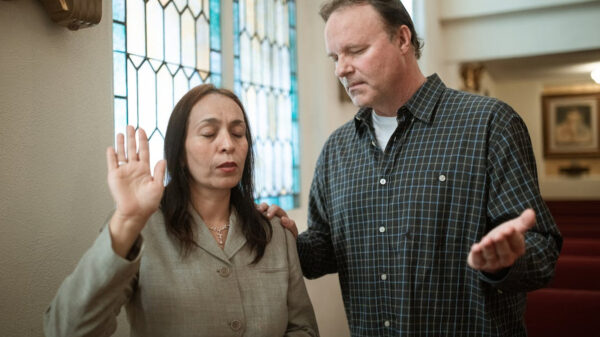
Mormonism is a works-based theistic system; salvation is not a free gift of God, but rather something that must be earned. In many of my conversations with Mormons, I’ve been directed to the Sermon on the Mount; Mormons often point to Jesus’ words here in an effort to make their case for a works-based theology. After Jesus confronts His listeners about their thought-lives related to murder, adultery, making vows, seeking vengeance and loving your neighbor (Matthew 5:21-47), He ends with the following admonition:
Therefore you are to be perfect, as your heavenly Father is perfect. (Matthew 5:28)
A number of Mormons have used this verse to illustrate the need each of us has to strive for perfection daily so we can eventually have eternal life with God in Celestial Kingdom. After all, isn’t Jesus telling us here that we must be perfect, as God is perfect, in order to please Him? While it’s tempting to talk about why this verse is not describing a requirement for salvation, I’ve discovered a better way to illustrate my response. Instead of initiating a theological discussion related to salvation, I simply ask my Mormon friend, “Are you perfect?” The overwhelming response is usually something akin to, “Well, no, I’m not perfect yet, but I’m trying hard every day.” It’s at this point that I calmly tell them, “As a Christian, I know that I am already perfect.” This response typically raises an eyebrow or two, but it allows me to talk about the difference between “practical” and “positional” perfection. Mormonism is a works-based theistic system; salvation is not a free gift of God, but rather something that must be earned. Click To Tweet
It’s definitely true that I am far less than perfect if, by perfect, you are trying to describe the practical reality of my everyday behavior. I’m a mess, even on my best day. But something wonderful happens when I trust Jesus to do for me what I cannot do for myself. His perfection is substituted for my imperfection; His pardon is exchanged for my guilt. When my Mormons friends take me to Matthew 5 to argue that practical perfection is a salvation requirement, I typically respond by taking them to Hebrews 10:
Every priest stands daily ministering and offering time after time the same sacrifices, which can never take away sins; but He, having offered one sacrifice for sins for all time, sat down at the right hand of God, waiting from that time onward until His enemies be made a footstool for His feet. For by one offering He has perfected for all time those who are sanctified. And the Holy Spirit also testifies to us; for after saying,
“This is the covenant that I will make with them
After those days, says the Lord:
I will put My laws upon their heart,
And on their mind I will write them,”
He then says,
“And their sins and their lawless deeds
I will remember no more.”
Now where there is forgiveness of these things, there is no longer any offering for sin. (Hebrews 10:11-18)
As a Christian, I am faultless in the eyes of God, not because I am practically perfect and faultless, but because God has perfected me for all time (verse 14). How did He accomplish this? It certainly wasn’t through anything I could do. My good works, my “offerings” and “sacrifices” are impotent and no longer needed in my hopeless effort to appease God. “God credits righteousness (to me) apart from works” (Romans 4:6); He exchanges my practical imperfection for the positional perfection of Jesus, offered to me at the cross. It’s really as simple as that. God is not condoning some form of “cheap grace” that liberates me to continuing sinning. I have new freedom from sin because God is changing my nature. He’s taking away my old desires and replacing them with new ones (more on that later in the week). God’s grace emboldens me to respond with a new life. Understanding the depth and nature of His gift to me, I cannot help but respond with a life that reflects my gratitude. Grace changes everything. We go to Utah because we want to introduce people to the freedom that is found in Christ. Click To Tweet
We travel to Utah because we see it as an important mission field. It’s a region filled with well-behaved, delightfully obedient, hard-working folks who simply cannot comprehend the nature of Grace and the true love of God. The task-master they serve is very different than the God of the Bible. We go to Utah because we want to introduce people to the freedom that is found in Christ. We go to Utah to help liberate people from the incredible, impossible burden of practical perfection. We hope, instead, to introduce them to the positional perfection that is found in Jesus alone. We hope to introduce them to the grace of God.

J. Warner Wallace is a Dateline featured Cold-Case Detective, Senior Fellow at the Colson Center for Christian Worldview, Adj. Professor of Christian Apologetics at Talbot School of Theology, Biola University, author of Cold-Case Christianity, God’s Crime Scene, and Forensic Faith, and creator of the Case Makers Academy for kids.
Subscribe to J. Warner’s Daily Email
J. Warner Wallace is a Dateline featured cold-case homicide detective, popular national speaker and best-selling author. He continues to consult on cold-case investigations while serving as a Senior Fellow at the Colson Center for Christian Worldview. He is also an Adj. Professor of Christian Apologetics at Talbot School of Theology, Biola University, and a faculty member at Summit Ministries. He holds a BA in Design (from CSULB), an MA in Architecture (from UCLA), and an MA in Theological Studies (from Gateway Seminary).










































Pingback: The Difference Between Christian Grace and Mormon Grace | Cold Case Christianity
Pingback: When Discomfort Is Definite Evidence | Cold Case Christianity
Pingback: Les Misérables and the Death Grip of Works-Based Worldviews | Cold Case Christianity
Pingback: Easter Reveals the Incompatible Nature of Our Religious Worldviews | Cold Case Christianity
Pingback: The Witnesses of the Resurrection Compared to the Witnesses of the Golden Plates | Cold Case Christianity
Pingback: I’m Not A Christian Because It Works for Me | Cold Case Christianity
Pingback: Why Christians Know They Have Eternal Life (Right Now) | Cold Case Christianity
Pingback: What is the Meaning of the Cross? | New York Apologetics
Pingback: The Difference Between Christian Grace and Mormon Grace – Uncaged Lion